- Home
- Stephen E. Ambrose
Ike's Spies Page 5
Ike's Spies Read online
Page 5
A great risk had been successfully run. Clark was a hero. Like Ike, Churchill had to hear the whole story, minute by minute. Later, Eisenhower took Clark to Buckingham Palace to meet King George, who said to Clark, “I know all about you. You’re the one who took that fabulous trip.”8
What were the practical results? In his memoirs, Eisenhower’s praise was slight at best. “This expedition was valuable in gathering more details of information,” he wrote. “These did not compel any material change in our planned operation.”9 In fact, nothing new had been learned, either about French military dispositions or political possibilities. Mast’s staff officers gave Clark’s staff a mass of information on the placement of shore batteries around Algiers, troop locations and strength, roads, checkpoints, and so on. The information was accurate, but it was not new—Colonel Eddy’s OSS agents had already informed Ike’s headquarters on all these points. The best that could be said about Clark’s information was that it confirmed earlier OSS intelligence.
In other areas, the Murphy-Mast meeting was even less helpful. Mast wanted to know the date of the invasion, so that he could make the necessary preparations to work together with Henri d’Astiers’ young men in the Chantiers de la Jeunesse to take possession of the key points in Algiers the night of the attack. But Ike had strictly forbidden Clark to divulge the date (which had been set for November 8; indeed, on the very day of the Mast-Clark conference, General George S. Patton’s combat-loaded forces had embarked from Norfolk, Virginia, target Casablanca). Clark, therefore, was vague about dates—sometime in February, he hinted, the assault would come. He was specific about the overwhelming force involved—there would be half a million troops, plus two thousand planes and a battle fleet from the U. S. Navy. “Mast was pretty impressed,” Clark recorded, as well he might have been.
The deception did not end there. Clark said it would be entirely an American operation, when in fact more than half the total military strength of TORCH was British. (It was assumed, on the basis of Murphy’s and Eddy’s reports, that the French in North Africa were so Anglophobic that they would resist a British landing while welcoming an American force.) Finally, Clark tried to reassure Mast about the command arrangements by saying that at some point in the future Giraud could have the supreme command.
For his part, Mast was not above a little deception. He continued to insist that French officers in Algeria would rally to the name Giraud, that they were seething with desire to strike out against the hated Germans and would seize the first opportunity to do so. But what would happen, Clark asked, if for some reason it was impossible to get Giraud out of France? Mast replied, “I will assume command.” It was a preposterous claim for a one-star chief of staff to make, and Clark asked the obvious follow-up question: “But will the troops rally to you?” Mast insisted that they would. What about General Juin, head of the French Army in North Africa? Mast was emphatic—he and his friends would take care of Juin.
How? Through d’Astier’s underground army of young men. This led Mast to make a request for two thousand Bren guns for the Chantiers de la Jeunesse. Clark might have picked up the hint here that Mast did not have the force he claimed to have, but instead Clark indulged in his own little deception, telling Mast that there would be no problem about getting the Brens. And so it went—bluff, subterfuge, and deception were the hallmarks of the clandestine meeting between Clark and Mast.10
How completely the potential collaborators misunderstood each other was shown immediately afterward. Murphy’s first act was to provide Dubreuil with a complete briefing on the meeting. Dubreuil then flew to France to meet with Giraud. He returned to Algiers the next day with a letter from Giraud, demanding an agreement in writing that he, Giraud, would be placed in charge of the “Interallied Command” forty-eight hours after the attack began, plus an assurance that an invasion of France proper would be launched shortly thereafter.11 Ike snorted at these obviously impossible requests.
On October 28, Mast indicated to Murphy that Giraud would not be coming out of France for a month or more. Much alarmed at the prospect of losing his chief actor, Murphy requested from Ike permission to tell Mast that the attack was imminent. Eisenhower reluctantly agreed. Murphy then told Mast that the Americans would arrive “early in November.” Mast, much agitated, charged Murphy with political blackmail, said it was simply impossible, and complained loudly about the lack of confidence. But eventually he got the word to Giraud, who responded that he could not possibly come to North Africa before November 20.
At this, Murphy went into a panic. He sent a message to Roosevelt, asking the President to postpone the expedition for two weeks. In justification, he concluded, “I am convinced that the invasion of North Africa without favorable French High Command will be a catastrophe.”
So, on the very eve of the invasion, at the first critical moment in his career as supreme commander, Eisenhower was being advised by his chief spy to call off his attack and reschedule it for two weeks later, or else face catastrophe. Ike’s reaction was to laugh. The intricate movement of vast fleets, coming from both England and the United States, as Murphy himself later wrote, could not be delayed by even one day without upsetting “the meticulous plans which had been meshed into one master plan by hundreds of staff officers of all branches of the armed forces of both Allied powers.”12 Ike wired Marshall, “Recent messages from McGowan indicate that he has a case of jitters.” In one message, Murphy had urged simultaneous attacks in Norway and western France. It was all ridiculous, but Ike was charitable: “I don’t mean to say that I blame McGowan,” he told Marshall. “He has a most delicate position and a stupendous job and one that is well calculated to develop a bit of hysteria as the critical hour approaches.”13
By this time, November 7, Ike had transferred his headquarters to Gibraltar. Arrangements had finally been made with Giraud, who was spirited out of France in a submarine, then transferred to a flying boat and taken to Gibraltar, where on the night of the invasion he met Ike. Giraud’s first words were a demand for command of the operation. He ordered a plane made ready to fly him to Algiers, enumerated the staff positions he wanted filled, and demanded that communications facilities be made available to him.
Ike ignored the demands. What we want, he said, is for you to make a broadcast to the French Army. Giraud flatly refused—he would not participate in TORCH except as supreme commander. Ike promised him “the governorship, virtually the kingship, of North Africa,” with unlimited funds to build an army and an air force, but Giraud kept saying non. He must have the command.
That is preposterous, Ike insisted. Very well, Giraud responded, he would stand aside, the French Army would fight, and the Allies would not even get ashore. With that, the seven-hour meeting ended. A disgruntled, exhausted, furious Eisenhower went off to the radio room to see if he could get any news from the invasion forces.14
What he got in the way of news was confused. One thing stood out—the Germans had no inkling of what was happening. Over 150 Allied ships had passed through the Straits of Gibraltar that day, a fact well known to the Germans, thanks to their Spanish friends, but the Gestapo and German military intelligence were convinced that the convoy’s destination was Malta. The basis for that judgment was the number of stories in the British press about “poor, suffering, brave Malta” and the need to resupply the island, stories that were planted to achieve that exact effect. Hitler’s intelligence service, in other words, was no good to him at all. While 110,000 Allied troops went ashore in North Africa, seven squadrons of Sicily-based Luftwaffe fruitlessly circled the Mediterranean opposite Cape Bon, waiting to bomb the “Malta-bound” convoy.15
Ike knew that the Germans were deceived, thanks to ULTRA, which provided proof through the Germans’ own words that they were fooled. The radio traffic between Sicily and Italy showed no indication of any special alert, much less a movement of troops to Tunisia. This negative information was heartening.16
And the French? Only the event itself could tell
if Mast would be able to bring the army around, even without Giraud, or if Henri d’Astier’s young men could take control of Algiers, even without their Bren guns, or if Darlan and Juin would cooperate. The least Ike needed was to “find divided councils among the French, which should prevent them offering really effective resistance.”17 He was attacking in sufficient force to ensure success, but any delay imposed by French resistance might prove disastrous to his real objective, which was to get control of Tunisia before the Germans could get there from Sicily. Much depended on how well Murphy, Eddy, and the OSS had done their jobs; even more depended, according to Murphy’s best intelligence, on whether or not Giraud would cooperate. And his parting words to Ike had been, “Giraud will be a spectator in this affair.”18
CHAPTER FOUR
Who Murdered the Admiral?
NOVEMBER 9, 1942, the day after Operation TORCH started. A tired Supreme Commander dictates a letter to Bedell Smith, still in London: “It isn’t this operation that’s wearing me down—it’s the petty intrigue and the necessity of dealing with little, selfish, conceited worms that call themselves men. All of these Frogs have a single thought—‘ME.’ ”1
Later that day, from his office deep inside the Rock of Gibraltar, Ike wires Marshall, “I find myself getting absolutely furious with these stupid Frogs.”2
STRONG STATEMENTS, especially coming from Eisenhower, who often expressed himself in blunt terms in conversation but usually was circumspect in his correspondence. He had reason for his passionate outburst. When the invasion began, Giraud and Darlan continued to jockey for position and refused to commit themselves to the Allied side, Colonel Eddy’s attempted coup at Oran failed, Henri d’Astier’s pro-Allied young men lost control of Algiers to the French Army, and, worst of all, fighting raged between Frenchmen and Americans at all three landing sites: Algiers, Oran, and Casablanca.
The Germans, meanwhile, although caught by surprise, were reacting with energy and efficiency, which only made Eisenhower more enraged at the French. ULTRA intercepts on the night of the invasion had shown that the Germans were sleeping, so Ike could take comfort in knowing that security for TORCH had been successful. But the next day ULTRA intercepts told Ike that Field Marshal Albert Kesselring, in Italy, was rushing men and supplies into Tunis and that Hitler had ordered the occupation of southern France. Forty-eight hours before the first Germans set foot in Tunis, Ike knew they were coming, in what strength, and how, but he could do nothing about it because his troops were tied down fighting the French. He had lost the strategic objective of the campaign before the campaign was even under way, and he knew it. Thus his tremendous rage, which grew in intensity with each passing hour. He was angry at Darlan, Juin, and Giraud for putting their “individual fortunes and opportunities” ahead of the Allied cause. “Right this minute,” he wrote Smith, “they should all be making it impossible for Admiral Esteva to permit the Germans into Tunisia. He apparently has the equivalent of three divisions down there and, without the slightest trouble, could cut the throat of every German and Italian in the area and get away with it.” He confessed that “a situation such as this creates in me so much fury that I sometimes wish I could do a little throat-cutting myself!”3
Ike meant it as a tiny joke, but joke or not, the subject of assassination kept coming up in conversations between the Allied leaders on Gibraltar. Giraud continued to say non to every proposal Ike made, and for the first twenty-four hours of the operation Ike assumed that Giraud was the only man who could get the French Army to stop fighting the Allies. Admiral Andrew Brown Cunningham, Eisenhower’s naval commander, suggested that they put Giraud in a cell and then make an announcement in his name. Butcher recorded that “all felt something had to be done … even a little airplane accident.” The Governor of Gibraltar told Ike that “he had a good body disposal squad if needed.”4
By the morning of the second day, Giraud began to sense the hostility and to realize that Ike was never going to turn over command to him. To everyone’s delight, he announced that he was ready to lead the French Army and agreed to fly to Algiers. He did so on November 10—and nothing happened. No one paid any attention. All of Mast’s promises to Murphy about the effect of Giraud’s announcement, and all of Murphy’s promises to Ike, turned out to be false. Not one French soldier rallied behind Giraud.
In Algiers, meanwhile, there was a terrible mess. On the night of the invasion, Henri d’Astier’s Chantiers de la Jeunesse had taken Juin and Darlan prisoner,* seized the radio station and police headquarters, and generally managed to get temporary control of the city, although not of the naval batteries or the harbor. But their arms were woefully out of date—none of the guns the OSS and Clark had promised had been delivered—and they acted without proper coordination or leadership. Worst of all, they struck too soon. Expecting the Americans at dawn, they seized control during the middle of the night. They could not hold it against the overwhelming force of the regular French Army in Algiers. By dawn, Juin had regained control.
General Mast, meanwhile, was out of touch, on the outskirts of Algiers, at a beach where he expected the Americans to land. But the landings were miles from the city and hours later than Mast expected them. The result of all these errors was that, instead of the Americans walking into a city already controlled by Mast and d’Astier’s underground army, they met stiff French resistance.5
In Morocco, too, the attempt to arrange a peaceful reception had been botched and the French were resisting. Vichy police arrested a pro-Allied French general, and General Auguste Nogues, in command in Casablanca, ordered all-out resistance. In Oran, Eddy’s OSS organization had been unable to take control, but the Allies arrived in such overwhelming force that they quickly overcame the French forces there. Ike was not especially worried about Casablanca, either, because Patton was in command at that site and it would not be long before he forced a French surrender. Even in Algiers, on Novemer 10, Juin ordered his troops to cease fire. At all three sites, in short, Eisenhower’s men had arrived in sufficient strength to overwhelm the French. The trouble was that the French in Tunisia were allowing the Germans to come into Tunis and none of the French officers in Algiers would issue orders to resist.
When a message came into Gibraltar from Murphy, saying that Darlan would talk to Eisenhower but to no one else, most especially not Giraud, “Ike spluttered.” Butcher reported that he swore, “What I need around here is a damn good assassin!”6 Admiral Cunningham laughed, then reminded Ike that Churchill had told him, “Kiss Darlan’s stern if you have to, but get the French Navy.” The French fleet was then in Toulon and it was thought that if Darlan ordered it to join the Allies, the fleet would do so. Ike decided to send Clark to Algiers to see what could be done about bringing Darlan over to the Allied side.
In selecting Clark, Eisenhower was indulging an old friendship, because certainly Clark’s first visit to Algeria had not been of any benefit to the Allies. Nevertheless, Ike continued to think highly of Clark, and even found cause for praise. In a letter to Marshall on November 10, Eisenhower said that Clark’s secret trip “had been immensely important to us in finding out exactly what was the majority sentiment in North Africa and in preparing the way for effective U.S.-French collaboration.” The exact opposite was the truth—Clark’s visit had failed to discover the crucial fact that Giraud’s name was of no consequence in North Africa, and there was no U.S.-French collaboration.7 Still Ike recommended Clark’s promotion to lieutenant general. He also remained loyal to Murphy, despite Murphy’s embarrassing failures.
Ike’s instructions to Clark, which served as the basis for the famous Darlan Deal, were straightforward and entirely in accord with the directions Ike had received from his superiors, Churchill and Roosevelt. Eisenhower said that the Allies had not come to North Africa to stir up “the tribes” or to replace any Vichy officials. It would be business as usual, and Darlan could be in charge, if only he would order the French forces in Tunisia to resist the German landings there. “I don’t
see why these Frenchmen, that are jockeying for personal power, do not see these things and move with speed,” Ike told Clark. He had become so cynical about Darlan, Juin, and Giraud that he added, “Give them some money if it will help.”8
Mark Clark flew to Algiers, where he quickly confirmed a deal that Murphy had already made with Darlan. It gave Darlan the title of High Commissioner in French North Africa. In return, Darlan promised to order Admiral Esteva in Tunis to resist. At Murphy’s insistence, backed up by Eisenhower, Darlan also had to agree to make Giraud the commander in chief of French forces in North Africa, which showed a rather astonishing loyalty to Giraud in view of his ineffectiveness. On November 13, Eisenhower and Cunningham flew to Algiers, where Ike took possession of his new headquarters, in the Hotel St. Georges, and summoned Darlan and Giraud to a meeting, where they examined and discussed the details of the deal.
Eisenhower was in a position to say no, to call it off, but he never considered such a possibility. His chief political adviser and spy, Robert Murphy, previously so forward and dogmatic in his recommendations, now threw up his hands and said, “The whole matter has now become a military one. You will have to give the final answer.”9 Ike never hesitated. All Murphy’s previous reporting had emphasized the importance of maintaining order in Algeria, and Murphy and Clark had both insisted that only the established Vichy officials could do that. Like American southern politicians dealing with blacks, they argued that only French colonial officers knew how to “handle” the Arabs. Ike himself had warned Clark not to create any dissension among the Arab tribes “or encourage them to break away from existing methods of control.”10

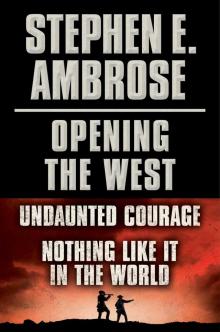 Undaunted Courage
Undaunted Courage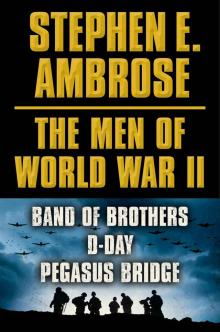 The Victors: Eisenhower and His Boys
The Victors: Eisenhower and His Boys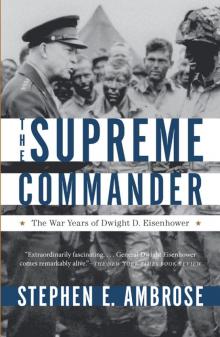 The Supreme Commander
The Supreme Commander Ike's Spies: Eisenhower and the Espionage Establishment
Ike's Spies: Eisenhower and the Espionage Establishment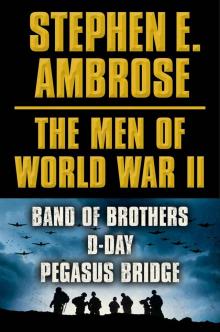 The Men of World War II
The Men of World War II Nothing Like It in the World The Men Who Built the Transcontinental Railroad 1863-1869
Nothing Like It in the World The Men Who Built the Transcontinental Railroad 1863-1869 Ike's Spies
Ike's Spies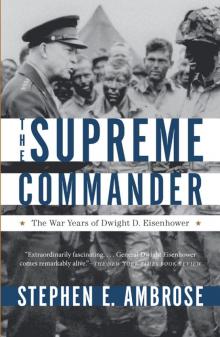 Supreme Commander
Supreme Commander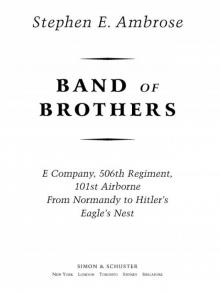 Band of Brothers
Band of Brothers